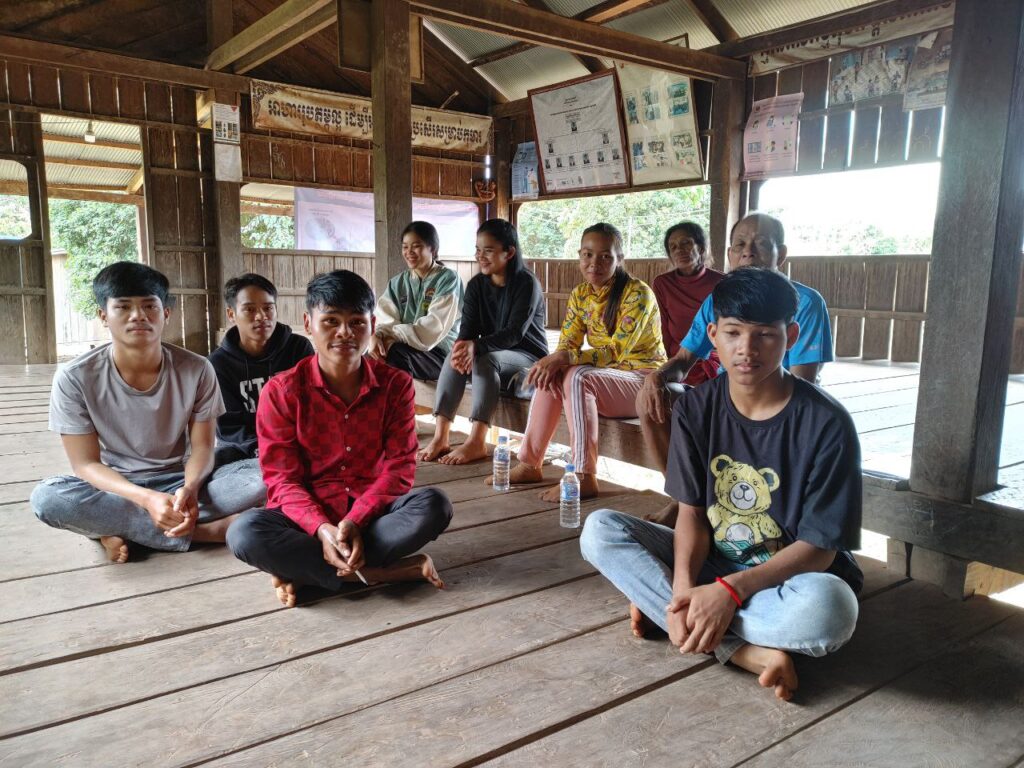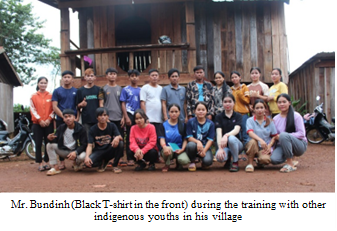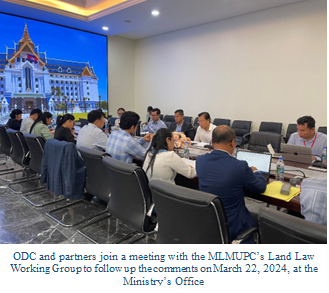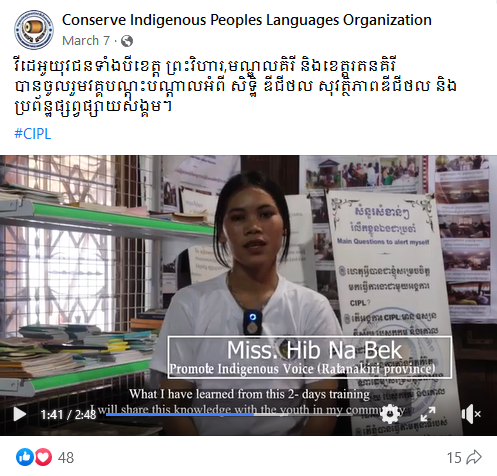Participating in discussions and learning about current issues boosts indigenous youth’s confidence.
“Because I participated in various activities and training, I now feel more confident in expressing myself and my community.”
Mr. Mong Samut is a 22-year-old Brao indigenous youth. He was born in a remote area located in Sieng Say village, Ta Veaeng Kraom commune, Ta Veaeng district, Ratanakiri province. This is where he is living with his family. As an indigenous youth, he had few opportunities for further education. He was a young farmer without a confident expression and so preoccupied with his job that he was unaware of the situation outside of the community. However, land and forestry issues have arisen in his community. He wishes to seek assistance and share these conflicts and challenges with others to obtain protective intervention.

Until he gets to know Open Development Cambodia (ODC) and Conserve Indigenous Peoples Languages (CIPL) organizations, he has a chance to learn and participate in various activities and training such as mobile report training, data visualization and storytelling, and identifying topics on natural resource, land, and environment. He has learned how to identify problems, edit videos, and gain basic knowledge of natural resources, land, and forestry. Even though his knowledge cannot be compared to that of people living in cities, he is dedicated and always pays more attention to the lesson and discussions.
The desire to express the community’s issues and challenges keeps him go on. He is ready to share what is going on in his community while gathering information from others to share with his own. He pledges to open his community’s culture, livelihood, and issues through what he learned if given the opportunity.
Similar Stories
From trainee to trainer: fostering indigenous youths’ capacity to proactively disseminate knowledge in their communities
The Civil Society Activity (CSS) project made significant progress in empowering indigenous voices, through its partnership with Open Development Cambodia (ODC) and Conserve Indigenous People\'s Language (CIPL) Organization. Acknowledging the limitations of training every community member, the project employed a strategic approach: transmitting knowledge from focal persons to their communities. These designated individuals have become conduits for information dissemination, resulting in a profound impact. Mr. Lao Bundinh is a 27-year-old Jarai indigenous youth living with his family in Pak Thum village, Pak Nhai commune, Ou Yadav district, Ratanakiri province. He had limited knowledge regarding social media, script writing, and other technological tools. Nevertheless, he had a strong desire to share his culture and voice with a wider audience through social media channels. He also faced a significant knowledge gap, particularly in the realm of digital security. Throughout his active participation in project activities, training sessions, and engagement with local authorities, he gained valuable insights and became aware of the knowledge gaps he needed to address. Despite encountering various challenges, including barriers related to knowledge, technical skills, and time constraints, he persevered and continued to pursue higher levels of expertise. He seized the opportunity to undertake the role of a trainer, conveying his acquired knowledge to indigenous youths within his community. His training sessions focused on topics such as Facebook security, Telegram two-step verification, and video production scripting. He also has gained the capability to express his insights and address community issues effectively through social media channels while sharing his knowledge within his community. He takes great pride in his personal growth and achievements, having reached this significant milestone. He remains committed to ongoing knowledge sharing and making contributions to increasing awareness among indigenous communities in the future.
The more the merrier: Incorporating inputs into the draft land law
The ODC\'s Civil Society Support Activity: Cluster Anchor Grant initiative demonstrates the value of collaborative advocacy and strategic participation in achieving legislative reforms that benefit society. ODC\'s path, which focuses on promoting meaningful engagement in natural resource management and building social inclusion, shows devotion, determination, and effective action. Our effort ensures that the voices of communities, Community-Based Organizations (CBOs), and Civil Society Organizations (CSOs) are not only heard but also integrated into the drafting process of the Land Law, which governs land rights and management in Cambodia. In January 2024, ODC began the process by formally requesting the draft Land Law from the Ministry of Land Management, Urban Planning, and Construction (MLMUPC), paving the way for collaborative involvement. When ODC received the draft Land Law in February 2024, its team immediately began mobilizing efforts. ODC organized coordinated events and dialogues to promote extensive consultations and discussions, involving stakeholders at both the sub-national and national levels. Working with legal experts, ODC ensured that the complexity of the legislation was clarified, allowing for involvement and informed input from the grassroots to the national level. ODC\'s collaborative efforts paid off, as we had inputs that reflected diverse viewpoints. With 60 pages of the matrix comments, ODC submitted its inputs to the Ministry within a tight timeframe (February 16), demonstrating its commitment to constructive participation and lobbying. Beyond the submission, ODC realized the value of ongoing communication and advocacy. Addressing gender equality in land ownership and encouraging continuous talks among CSOs, ODC highlighted concerns and options for future engagement with the Ministry. ODC\'s proactive approach resulted in a follow-up meeting request, indicating its commitment to ensure that ODC\'s inputs are not just recognized but also included in the legislative process. “Thank you! I appreciate the inputs and comments from the CSOs on the Draft Land Law. If the government asks the consultant to do it, it might take a million dollars to do so”, H.E. THENG Chan-Sangvar, Secretary of State and MLMUPC’s Land Law Working Group. The impact of ODC\'s combined efforts was clear when the Ministry acknowledged and integrated more than 15 points from ODC\'s submission, indicating a significant step toward inclusive policymaking. While ODC\'s efforts are not always directly acknowledged, the realization of their combined impact emphasizes the significance of ongoing lobbying and collaborative participation. Contributing to the new draft Land Law, ODC remain committed to working for communities\' rights and interests. Armed with knowledge, unity, and a common vision for a more fair and equitable society, ODC are prepared to face the challenges ahead, confident in its power to affect significant change through collective action.
CIPL’s video on digital rights and social media training
The training covered the topics of human rights, digital rights, digital media, and digital trends in Cambodia. Pre and post-test results illustrated that 73% of the trainees improved their knowledge regarding digital security and rights.


